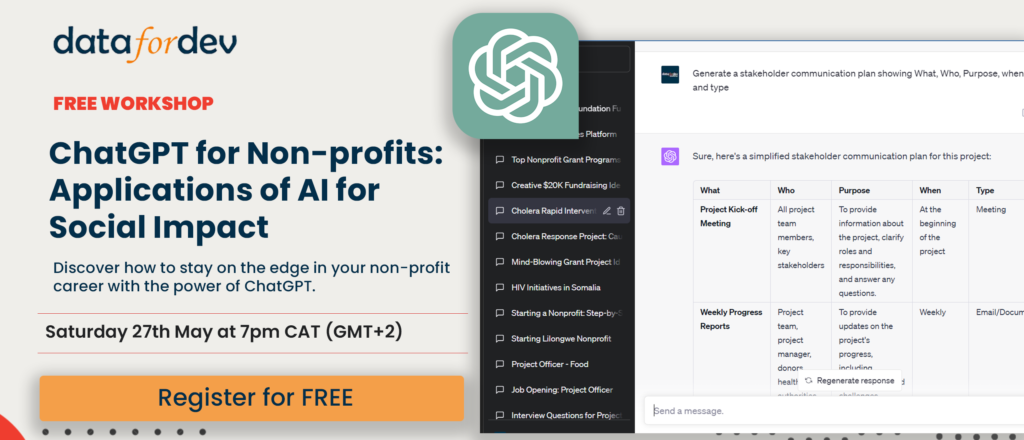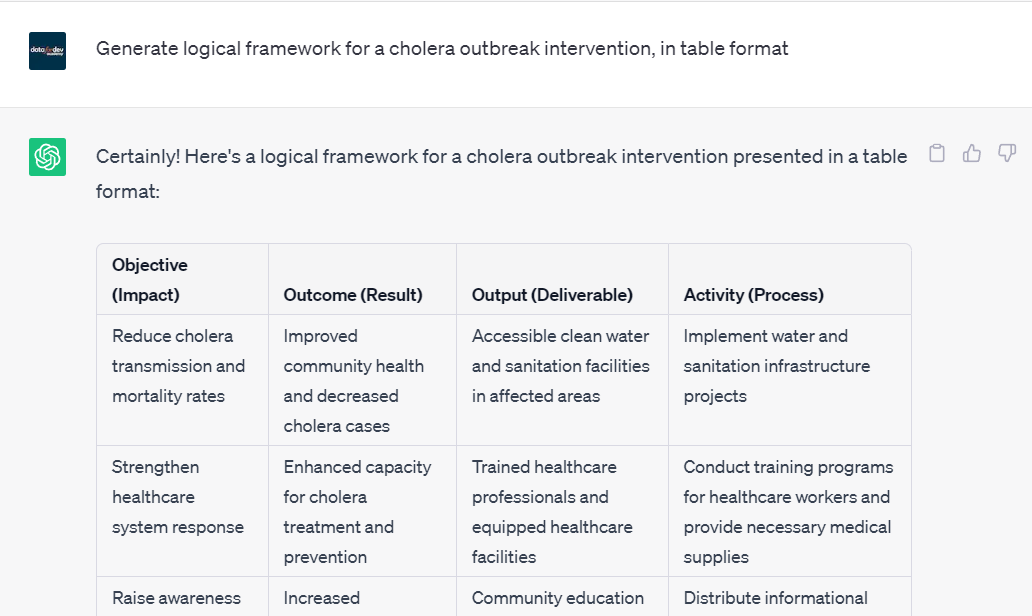“Artificial Intelligence,” “Generative AI,” “ChatGPT,” these terms have likely frequented your reading material. This is primarily due to the substantial conversation around the topic, driven by its potential for immense benefit or cause for concern.
Undeniably, we are witnessing an AI-driven era marked by a swift evolution of technology, transforming every sector. However, the non-profit sector often slips under the radar in discussions about AI. As this technology permeates social impact initiatives, it is critical to evaluate the opportunities it presents and the challenges we need to anticipate.
Generative AI, exemplified by OpenAI’s ChatGPT, uses machine learning to generate human-like text. This capability proves beneficial across various functions, such as creating a logical framework for an initiative, drafting donor emails, or planning fundraising events.
For non-profit organizations, AI tools offer numerous possibilities to optimize operations, streamline processes, and amplify social impact. However, these advantages come with significant challenges that demand thoughtful consideration and strategic action.
Opportunities of Generative AI for Nonprofits
- Efficiency and Cost-effectiveness: The efficiency of generative AI presents a valuable opportunity for nonprofits. For instance, a task such as writing a donor report, which might typically take a week, could be accomplished in less than five minutes using ChatGPT.
By employing AI, nonprofits can refocus human resources on strategic decision-making and high-value tasks like fieldwork, leading to increased cost-effectiveness. Consider this scenario: during a cholera outbreak, instead of spending weeks brainstorming and developing action plans, AI could accelerate this process to a few hours. This would free up considerable time to provide direct assistance where it’s most needed — with beneficiaries.

- Capacity Building: Generative AI tools, like ChatGPT, are trained on extensive information databases. This gives users access to a tool that is, essentially, omniscient. Incorporating these tools into a nonprofit can significantly boost capacity, enabling unprecedented productivity levels. Such tools can also be used for staff and volunteer training.
- Program Development and Fundraising: A nonprofit’s survival hinges on its ability to develop impactful initiatives and secure funding. Generative AI tools like ChatGPT can aid in conceiving and creating innovative programs and initiatives. They generate ideas and proposals modeled on successful precedents. Additionally, they can enhance fundraising and donor engagement by generating plans and crafting bespoke messages. Given adequate training data, generative AI tools can analyze donor behavior and customize fundraising appeals, potentially driving increased donations.
- Advanced Data Management and Analysis: Generative AI can be deployed to create effective monitoring, evaluation, and research tools. It can analyze vast amounts of data, converting it into actionable insights for strategic planning. It can also identify patterns and trends, assisting nonprofits in making data-driven decisions to enhance the impact and reach of their programs.
- Expanding Accessibility: Generative AI can significantly enhance nonprofits’ accessibility by overcoming language barriers. AI-powered translation can facilitate global reach, enabling nonprofits to connect with diverse populations, engage international donors, and implement programs worldwide.
- Scaling Impact through Automation: Using tools like ChatGPT, tasks traditionally requiring a large workforce can now be automated. This development allows smaller nonprofits to achieve a larger impact. Generative AI can be employed not only in the background of social impact work but also on the frontlines, such as in information portals, tailored help centers, and more.

Challenges of Generative AI for Nonprofits
- Data Privacy and Security: As nonprofits increasingly adopt AI tools, the volume of data they manage increases proportionally. As such, ensuring data privacy and security becomes critical. Nonprofits will need to implement robust cybersecurity measures to safeguard sensitive information, as breaches could erode stakeholder trust and lead to legal consequences.
- Ethical Considerations: AI usage prompts complex ethical questions about bias and fairness. Machine learning models like GPT learn from historical data, which can often be biased, leading to unfair results. Nonprofits must contemplate these ethical implications and strive to use AI in a way that aligns with their mission and values.
- Widening of Inequalities: Due to inequities in technology access and technical literacy, especially in developing countries, these technologies risk exacerbating the digital divide. Those with access to these technologies may make significant strides, while those without may fall far behind.
- Dependency and Job Displacement: Over-dependency on AI poses a risk of job displacement, particularly in administrative roles. Nonprofits must consider a balanced approach where AI supplements, rather than replaces, human labor. Over-reliance on technology vendors or external partners for AI needs could also become problematic in the event of disagreements, service disruptions, or vendor insolvency.
- Reliability of AI Outputs: The outputs from generative AI models, while sophisticated, may not always be reliable or accurate, potentially leading to misinformation.
- Regulatory Compliance: As AI technology evolves, so does the regulatory landscape. Keeping pace with these changes and ensuring compliance can be a formidable challenge.
Navigating the AI Landscape: A Way Forward for Nonprofits
To fully leverage the potential of generative AI, nonprofits must devise a comprehensive AI strategy. This involves investing in staff training, collaborating with technology partners, and adopting a proactive approach to ethical considerations and data privacy.
Lastly, nonprofits should endeavor to foster a culture of innovation, curiosity, and problem-solving, embracing technological advancements like generative AI.

